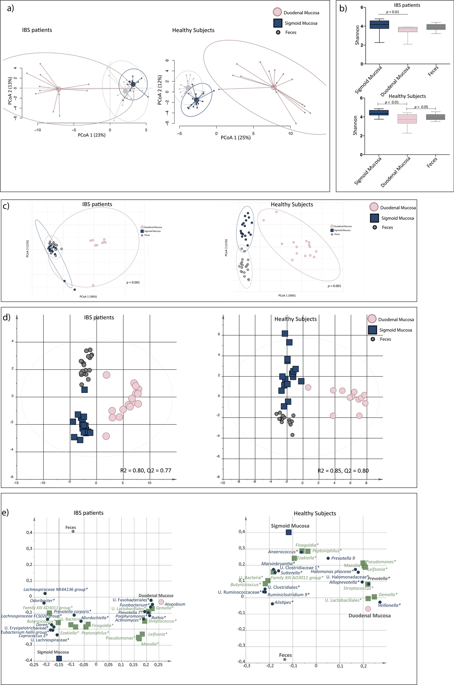Our official English website, www.x-mol.net, welcomes your
feedback! (Note: you will need to create a separate account there.)
Evidence of altered mucosa-associated and fecal microbiota composition in patients with Irritable Bowel Syndrome.
Scientific Reports ( IF 3.8 ) Pub Date : 2020-01-17 , DOI: 10.1038/s41598-020-57468-y Johanna Sundin 1, 2 , Imran Aziz 1 , Sofia Nordlander 1, 2 , Annikka Polster 1 , Yue O O Hu 3 , Luisa W Hugerth 3 , Alexandra A L Pennhag 3 , Lars Engstrand 3 , Hans Törnblom 1 , Magnus Simrén 1, 4 , Lena Öhman 1, 2
Scientific Reports ( IF 3.8 ) Pub Date : 2020-01-17 , DOI: 10.1038/s41598-020-57468-y Johanna Sundin 1, 2 , Imran Aziz 1 , Sofia Nordlander 1, 2 , Annikka Polster 1 , Yue O O Hu 3 , Luisa W Hugerth 3 , Alexandra A L Pennhag 3 , Lars Engstrand 3 , Hans Törnblom 1 , Magnus Simrén 1, 4 , Lena Öhman 1, 2
Affiliation

|
Altered bacterial composition and small intestinal bacterial overgrowth (SIBO) may be associated with irritable bowel syndrome (IBS). This study aimed to determine the fecal and mucosa-associated bacterial composition along the gastrointestinal (GI) tract and to assess SIBO in IBS. Bacterial composition of feces, and mucosa of the duodenum and sigmoid colon was determined by 16S rRNA-amplicon-sequencing. SIBO was evaluated by bacterial culture of duodenal aspirate, glucose and lactulose breath tests. Mucosal antibacterial gene expression was assessed by PCR Array. The bacterial profiles of feces and the mucosa of sigmoid colon, but not duodenum, differed between IBS patients (n = 17) and HS (n = 20). The IBS specific bacterial profiles were linked to the colonic antibacterial gene expression. Fecal bacterial profile differed between IBS subtypes, while the mucosa-associated bacterial profile was associated with IBS symptom severity and breath tests results at baseline (H2 and/or CH4 ≥ 15 ppm). The prevalence of SIBO was similar between IBS patients and HS. This study demonstrates that alterations in the bacterial composition of the sigmoid colon of IBS patients were linked to symptoms and immune activation. While breath tests reflected the mucosa-associated bacterial composition, there was no evidence for high prevalence of SIBO or small intestinal bacterial alterations in IBS.
中文翻译:

肠易激综合征患者黏膜相关和粪便微生物群组成发生改变的证据。
细菌成分改变和小肠细菌过度生长(SIBO)可能与肠易激综合症(IBS)相关。这项研究旨在确定沿胃肠道(GI)的粪便和与黏膜相关的细菌组成,并评估IBS中的SIBO。通过16S rRNA-amplicon测序确定粪便,十二指肠和乙状结肠黏膜的细菌组成。通过十二指肠抽吸,葡萄糖和乳果糖呼气试验的细菌培养评估SIBO。通过PCR Array评估粘膜抗菌基因表达。IBS患者(n = 17)和HS(n = 20)之间的粪便和乙状结肠黏膜的细菌特征有所不同,但十二指肠没有差异。IBS特定细菌概况与结肠抗菌基因表达有关。不同IBS亚型的粪便细菌特征有所不同,而与黏膜相关的细菌特征与IBS症状严重程度相关,并且在基线时(H2和/或CH4≥15 ppm)进行呼气试验结果。IBS患者和HS之间SIBO的患病率相似。这项研究表明,IBS患者乙状结肠细菌组成的改变与症状和免疫激活有关。虽然呼气测试反映了与粘膜相关的细菌组成,但没有证据表明IBS中SIBO的患病率很高或小肠细菌改变。这项研究表明,IBS患者乙状结肠的细菌组成改变与症状和免疫激活有关。虽然呼气试验反映了与粘膜相关的细菌组成,但没有证据表明IBS中SIBO的患病率很高或小肠细菌改变。这项研究表明,IBS患者乙状结肠的细菌组成改变与症状和免疫激活有关。虽然呼气试验反映了与粘膜相关的细菌组成,但没有证据表明IBS中SIBO的患病率很高或小肠细菌改变。
更新日期:2020-01-17
中文翻译:

肠易激综合征患者黏膜相关和粪便微生物群组成发生改变的证据。
细菌成分改变和小肠细菌过度生长(SIBO)可能与肠易激综合症(IBS)相关。这项研究旨在确定沿胃肠道(GI)的粪便和与黏膜相关的细菌组成,并评估IBS中的SIBO。通过16S rRNA-amplicon测序确定粪便,十二指肠和乙状结肠黏膜的细菌组成。通过十二指肠抽吸,葡萄糖和乳果糖呼气试验的细菌培养评估SIBO。通过PCR Array评估粘膜抗菌基因表达。IBS患者(n = 17)和HS(n = 20)之间的粪便和乙状结肠黏膜的细菌特征有所不同,但十二指肠没有差异。IBS特定细菌概况与结肠抗菌基因表达有关。不同IBS亚型的粪便细菌特征有所不同,而与黏膜相关的细菌特征与IBS症状严重程度相关,并且在基线时(H2和/或CH4≥15 ppm)进行呼气试验结果。IBS患者和HS之间SIBO的患病率相似。这项研究表明,IBS患者乙状结肠细菌组成的改变与症状和免疫激活有关。虽然呼气测试反映了与粘膜相关的细菌组成,但没有证据表明IBS中SIBO的患病率很高或小肠细菌改变。这项研究表明,IBS患者乙状结肠的细菌组成改变与症状和免疫激活有关。虽然呼气试验反映了与粘膜相关的细菌组成,但没有证据表明IBS中SIBO的患病率很高或小肠细菌改变。这项研究表明,IBS患者乙状结肠的细菌组成改变与症状和免疫激活有关。虽然呼气试验反映了与粘膜相关的细菌组成,但没有证据表明IBS中SIBO的患病率很高或小肠细菌改变。











































 京公网安备 11010802027423号
京公网安备 11010802027423号